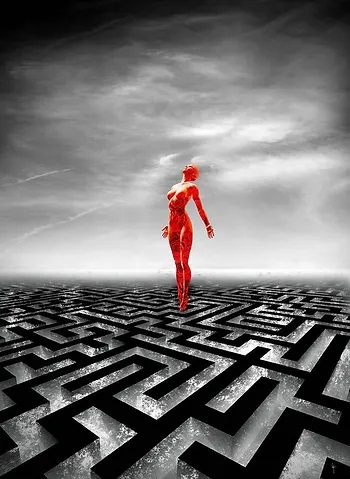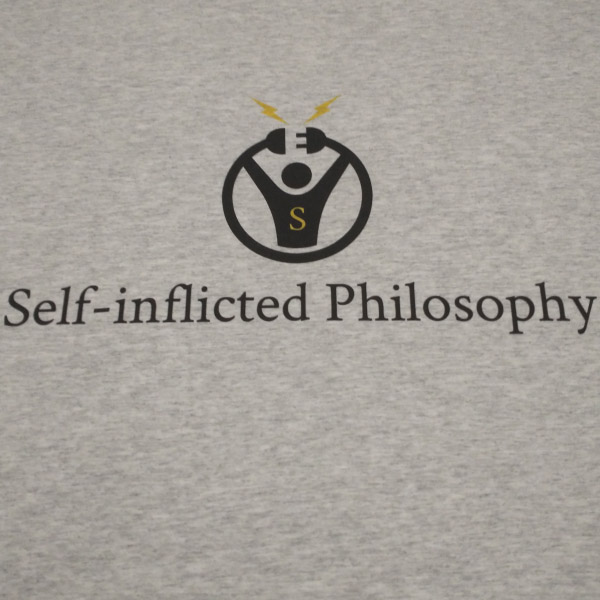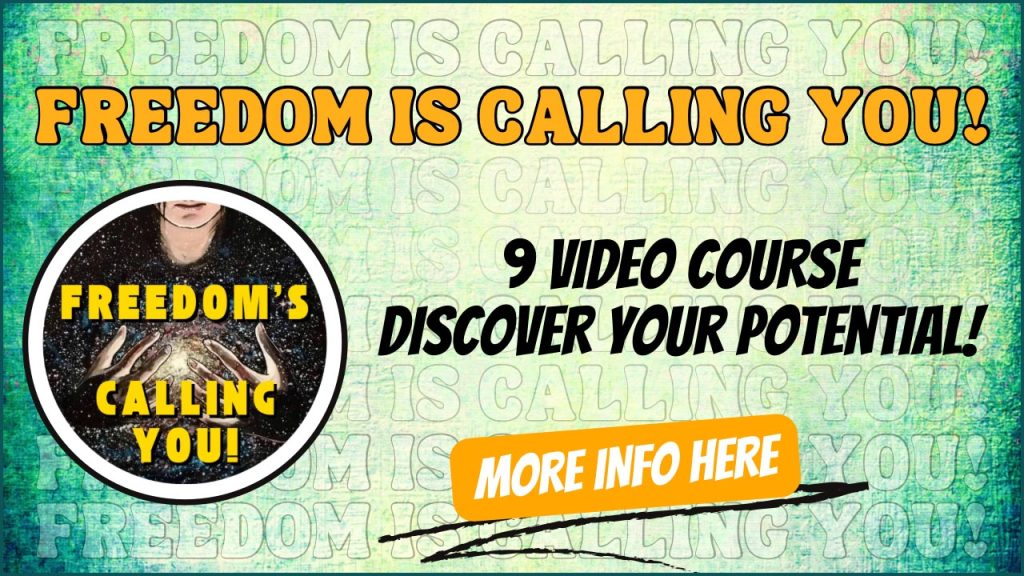www.self-inflictedphilosophy.com
To Boldy Know
What No One Has Known Before
by Gary Z. McGee
“The art of knowing is knowing what to ignore.” ~Rumi
Knowing things has always been an esteemed ability. Knowledge increases our ability to adapt and survive. The more we know, the better we can navigate the labyrinth of life. But knowing things can also hinder our ability to know more. There are landmines of cognitive dissonance that arise from knowing. Especially when we become certain about what we think we know.
Knowledge is a quagmire that can easily turn into a sticky web. There’s the extraction and the abstraction of knowledge. There’s our perception of that knowledge, which very well could be wrong. There’s the mortal anxiety and existential angst that comes from the knowledge of death. And then there’s the deliciously heavy weight of knowing that we know nothing. A tangled web indeed.
So how do we extract ourselves from the web? How do we escape the quagmire? How do we climb out of the abyss of not knowing that we don’t know? We use curiosity to trump our certainty. We allow ourselves to be wrong. We climb up onto the summit, into a state of knowing that we don’t know.
It’s like that old Zen Proverb about the empty cup. The experience of knowing that we don’t know empties our cup. It allows us to “not know” so that we can become “empty” enough to receive new knowledge. “I don’t know” frees us to thrive in a state of prepared learning. Education by perpetual astonishment becomes the thing. We use the philosophical tool of “I don’t know” in order that we may be astonished by knowing something new.
As Iris Murdoch said, “We live in a fantasy world, a world of illusion. The great task in life is to find reality.”
We are tasked as freethinking individuals to “find reality” despite the “world of illusions” that surrounds us. We are tasked with a Truth Quest. We are the tip of the spear of the evolution of our species. It is our task to know what has never been known before.
But before we can do that, we must be able to get out of our own way. In that regard, here are four ways to boldly know what no one has known before…
1.) Transcend yourself (practice nonattachment):
“Think lightly of yourself and deeply of the world.” ~Miyamoto Musashi
What you call knowledge is an attempt to impose something comprehensible onto something incomprehensible. Your knowledge hitherto is an abstraction of an abstraction, but that does not mean it’s not useful. In fact, it’s vital. It has made you who you are. And who you are, right now, in this moment, is a powerful thing. Because who you are right now is precisely what you must transcend in order to know what has never been known before.
So there you sit, a collection of memories, the embodiment of your own unique historical knowledge. You are grounded, centered, and prepared to receive new knowledge. Now it’s time to let it all go. Let go of your memories, your culturally conditioned reality, your attempt to impose something comprehensible onto something incomprehensible. Surrender. It’s time to sacrifice your knowledge to your imagination.
When you sacrifice your knowledge to your imagination you become detached (nonattached) to the past or the future. You become present, open, circumspect. Your sacrifice feeds the animal of higher learning. Its appetite becomes your appetite. And suddenly you are hungry for more, for novelty, for something extraordinary, for something otherworldly, for knowledge that has never been known before.
2.) Transcend culture (think outside the box):
“A good philosopher is one who does not take ideas seriously.” ~Edward Abbey
Culture is an illusion. Employ your mind as a mirror. Reflect the illusion. Receive but do not keep. Absorb but do not cling. Learn but do not dwell. Question but remember to never settle on an answer. Settling for an answer is giving up on your goal of knowing something that has never been known before. Never settle. Even if the answer seems convincing. Question it. Always question it. Especially if it is presented as something you must believe in.
Asking difficult questions (challenging culture) will always be more important than receiving simple answers (accepting culture).
As Ernest Becker said, “The essence of normality is the refusal of reality.” You’re not seeking normality. You’re seeking novelty. You’re seeking higher knowledge. You’re seeking that which has never been known before. Therefore, you cannot afford to refuse reality. You must embrace it. Refuse the cultural illusion instead.
Allow reality to sink it’s claws into you. Let it demolish your comfort zone, tear to shreds your existential veil, break apart your protective shell. The path toward knowing that which has never been known before is about vulnerability not invulnerability. So be vulnerable to the primordial horrors. Show your belly to the existential doom. Let infinity drag you kicking and screaming into the pain of higher knowledge lest the bliss of ignorance keep you trapped in lower knowledge.
3.) Transcend nihilism (integrate death):
“Much of our lives are spent running from our own shadow. The denial of death and the division of the human soul go together.” ~John Gray
So, you’ve transcended the psychosocial comfort blanket of mother culture. You’ve been left hanging in absolute nothingness. Absurdism is all consuming. Now, it’s time to bring meaning to the meaninglessness. You’ve already pierced through the blinding light of culture with your powerful tenebrosity, now it’s time to shine a light into the darkest darkness of all: nihilism.
The cure for nihilism is embracing absurdism. You either integrate absurdity or absurdity disintegrates you. You either loosen your grip or your own grip chokes you. You must integrate death, meaninglessness, and pointlessness. You must subsume your mortality and turn it inside out. Use it to absorb the interconnectedness of all things. Once again, you must fall into “not knowing.” Loosen your grip. Fall into Infinity.
As William Shakespeare said, “Life is a tale told by an idiot, full of sound and fury, signifying nothing.” So be it. Embody that nothingness and then transform it into something profound through the sieve of your imagination.
4.) Transcend transcendence (write poetry):
“Outlaws, like poets, rearrange the nightmare.” ~Tom Robbins
Once you have integrated death and resolved nihilism by embracing absurdism, the nightmare is seen for what it is. And the nightmare needs color. It must be hijacked by the imagination. So, it’s time to express yourself. It’s time to tap the Fountainhead. It’s finally time to know that which has never been known before.
Now enter the poet. The poet’s job is to reorder outdated order through artistic disorder. Poets are fierce discoverers. They are the tip of the spear of human imagination. They penetrate rigidness. They go beyond boundaries. They forsake all comfort zones. They dare to lose their footing and “slip into the masterpiece.”
The magic of poetry is the shaman in the abyss transforming darkness into light. It’s the blacksmith of the soul sharpening metal into Mettle. It’s a nonviolent dance-off in place of a violent stand-off. It’s planting seeds of curiosity in the rigid compost heap of certainty.
Poets tonalize an otherwise atonal world. They breech social constructs. They reimagine imagination. They inject what’s never been known into the vein of the known. They reinvent God. They do so for the survival of the human soul despite the nightmare that outflanks it.
Left alone, knowledge (and the culture that creates it) is a house of mirrors that will trap you in its illusions unless you are able to escape. Art is an escape. Music is an escape. Poetry is an escape. Cinema is an escape. When you are able to create these, you build bridges out of the so-called “real world” into Reality.
As Jim Harrison said, “A poet is a ‘thief of fire’.” Such fire burns all illusions. It awakens all delusions. It opens the closeminded. It allows access to that which has never been known before.
So there you are, a poet, nonattached, thinking outside the box, death integrated, sitting on the highest branches of human knowledge seeing further than all the giants of the past. You are an eternal fisherman fishing in the cosmic waters of the Unknown. You are both Hook and Lure, cast and castor, grounded and swimming, discovered and seeking. What you’ve known is behind you. What you can know is ahead of you. What you can never know is beside you. But what has never been known before is just a leap of imagination away.
But fisherman beware. As Nietzsche said, “I cast my net into the poet’s sea hoping to catch a fine fish; but I always drew out an old god’s head.”
Image source:
About the Author:
Gary Z McGee, a former Navy Intelligence Specialist turned philosopher, is the author of Birthday Suit of God and The Looking Glass Man. His works are inspired by the great philosophers of the ages and his wide-awake view of the modern world.
This article (To Boldly Know What No One Has Known Before) was originally created and published by Self-inflicted Philosophy and is printed here under a Creative Commons license with attribution to Gary Z McGee and self-inflictedphilosophy.com. It may be re-posted freely with proper attribution, author bio, and this statement of copyright.















